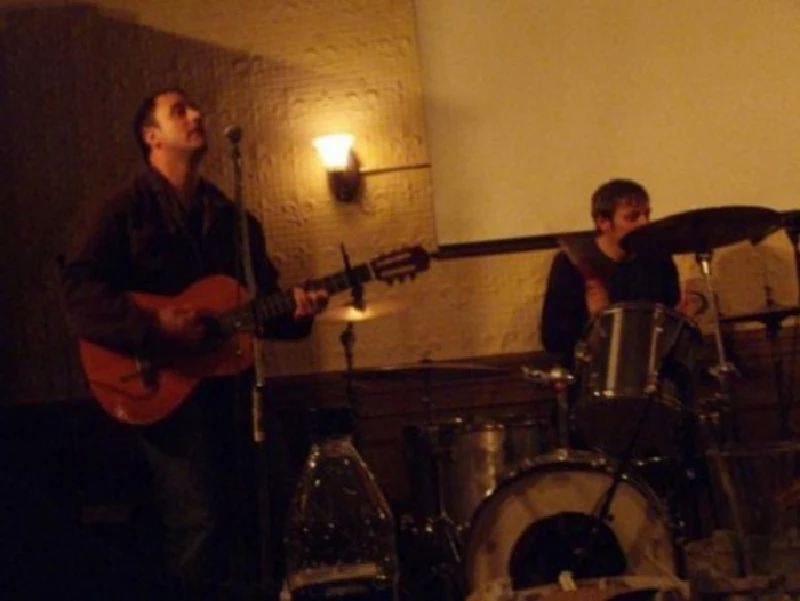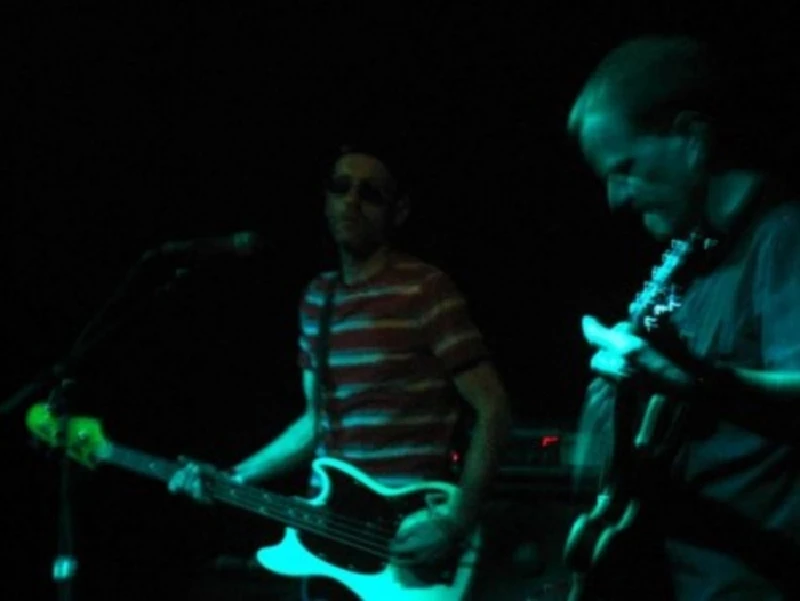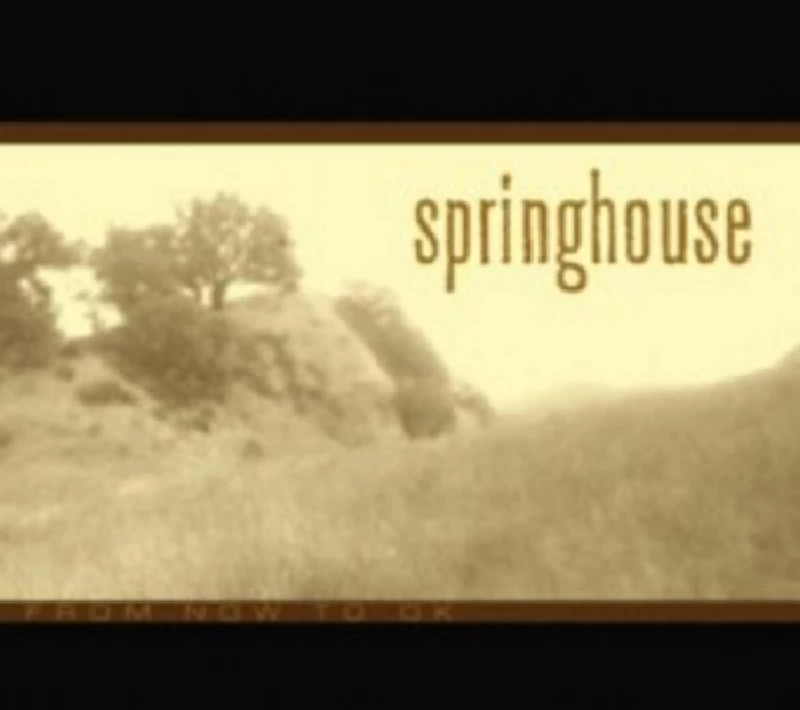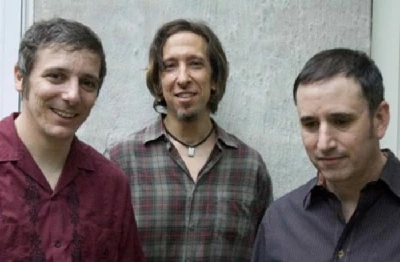Springhouse - Interview Part 2
by John Clarkson
published: 11 / 1 / 2009

intro
while in the second part they talk about getting back together, the new album which taken ten years to make, and making music entirely on their own terms
PB : Within nine months of breaking up in 1993 you were, however, back out on the road together playing support dates with Mark Burgess. A couple of years after that you reconvened on what was originally going to be a solo album for Mitch and since then there have been another two tours. Springhouse may have only got together really sporadically, but in hindsight do you think you ever really split up ? MF : Some people have bitter break-ups. It was never a bitter break-up. It wasn't like, "I am never going to talk to you again". We remained friends. We just needed some time off to heal our wounds and, when the Burgess thing fell in our lap, we thought, "Yeah, we'll do that." JR : I think we truly spilt up in 1993. We were very bitter about it. As far as I knew we were never going to play again, but the the opportunity to tour with Mark, who was I was friends with, came along and I ran it past Mitch and Larry. Leaving it the off the way we did had left a bad taste. A lot of those shows especially those in the Deep South was like the Sex Pistols tour, but only without the notoriety. It was like what are we doing here ? Why are we playing in Baton Rouge ? Why are we playing in Oxford, Mississippi. People don’t understand our music here. They don’t even understand the better known bands. That is what you do if you are an American band. You are obliged to play all these secondary markets if you do a seven week tour. It was just such a great experience playing with Mark and his band and in front of full crowds every night with people who enjoyed our music. They were playing mainly Chameleons songs and it was a good match. It was like this incredibly positive thing to have left off on such a negative stead and then to do that after we had thought that we would never play again. LH : I do feel like we did split up. I tend to do things these days on a project by project basis and how much fun it is going to be. Having fun is really a huge thing for me. There is a lot of duty in being in a group. You do the fun and the not non-fun, and I do have to say since 1994 I have had a lot more fun. If something doesn’t sound it is going to be fun, I won’t do it anymore. I don’t feel the obligation to do something if I don’t have to and that that for me has made an immense difference. PB : How did ‘From Now to OK’ come together ? JR : Mitch, Larry and I were still seeing each other all the time as friends and Larry had built a recording studio with the money he made from the Blue Man Group. That is really his passion, making records and recording people, and the rest fell in with that. LH : I had built this home studio and I needed to do some work in it to get my chops together. I went to Mitch and asked him if he had a song. I was just at the beginning of my doing my ten years of production work for Blue Man as its Musical Director and I also wanted to do some production work outside it. I needed the practice really and just wanted to put my toe in there. It didn’t start off like, “Hey ! Let’s put Springhouse back together and record ten songs.” JR : Mitch wanted to put out a solo record. Pretty soon Larry was playing bass for him as well as producing. They needed a drummer and who was going to play drums for them ? Well, me, of course. It wasn’t a case of “Let’s get the band back together.” It was about three friends who really enjoyed making music together and who were in love with the songs that Mitch had written. PB : You began work on ‘From Now to OK’ in 1998. It has taken ten years to complete. Why has it taken so long ? Was it because after your previous experiences in the record industry that you felt that if you were going to make another record then it had to be purely under your own terms ? LH : Absolutely. If we were going to do this, we wanted to get it as right as we possibly could. That was part of it. Part of it too was because of my work situation. JR : Larry is a really busy guy. He was making records with other people as well, and also the Blue Man Group keeps him very busy even though he is not technically their Musical Director anymore. He is really the great musician out the three of us. He can loan himself out as a hired gun to just about anybody on any tour. MF : It was a stop and go situation Larry also moved from Hoboken to New Jersey City in the middle of recording and changed studios. We had to wait for that studio to be built. That was another reason why it took so long. LH : There were close to year spans where nothing happened, and where I was on the road and gone. During those ten years there was a span of about eight months or a year when we worked on the album. Part of it too was we kept changing things. On our first two albums most of the songs were worked out live or in the rehearsal room beforehand. With this one, we had done some writing in the pre-production process, but, as it was done at home and we weren’t having to pay for expensive studio time, we kept on fleshing things out. A decent amount of energy went into finalising the compositions. We also had a few false starts. We might get a vocal track or two done, and then realise that there was a stronger melody or lyric to be had. MF : Larry kept on finessing and finessing the sound and getting it to sound as good as he possibly could. He has done a great job, but of course when he listens to it now he says, “Oh, there are so many different things that I could have done.” Everybody says that though. It is like what Paddy McAloon from Prefab Sprout said, “I wish we could take all the old albums and remix them. (Laughs)” PB : The first two Springhouse albums, and especially ‘Postcards from the Arctic’, were much darker in tone. Even the title of ‘From Now to OK’ suggests an increased optimism and that is confirmedin the upbeat nature of much of the music and also song titles such as ‘Passion’, ‘Grateful’ and ‘Anew’. What do you think has been the prime reason for this increased hope ? JR : We should have called that second album ‘The Divorce Album’ (Laughs). Mitch was going through a divorce at that time and had a one year old child. Springhouse has always written about what is in our hearts, and Mitch wrote about the sort of screaming depression that accompanies any divorce, especially one with a child. MF : When I started writing again after Springhouse broke up, I said to myself, “I really don’t want to be writing songs that are so dark.” For a while I used to equate Springhouse and making music with something that is going to turn out bad, not musically bad, but just emotionally bad. I knew that I had to get out the way of thinking. It wasn’t as if had received my lifetime achievement award (Laughs) and I had nothing left to do musically, so when I started writing songs again I thought, “Instead of writing about things that are bad, how are about writing things with a little more hope and a little more light to them ?” That is how the songs ‘From Now to OK’ started coming about. JR : I wrote seventy percent of the lyrics of‘Land Falls’ and I let Mitch write seventy five percent of the lyrics of the ‘Postcards' album, not only because he had a lot to say, but because he is the singer and it is better him singing his own words rather than mine. It was the same thing with this record. It was going to start as a Mitch solo record and I only wrote the lyrics for ‘Passion’, which is the one song I sing on the album. He wrote this album about the period between his divorce and now. He and his current wife had this on-again off-again thing for about eight years before it ended in a happy ending with them getting married. They held onto the dream though and they kept going even when they had split up for a while and fortunately then got back together. That is really the theme of this record, him getting over that divorce and starting up with a new girl and having this endless stop start thing. It is reflected in the music, in the optimism he felt even when things were going bad that they would still work out this time, and that they would get through their problems and keep going. LH : I had the least hand in the lyrical content out of the three of us, but I find myself drawn to lighter things the older I get. I know that life has enough dark in it and I am little less inclined to revel in it in my art. Relentlessly chirpy art is not terribly interesting to me, but on the other hand relentlessly dark art is no longer interesting to me either. I like complex music that is a juxtaposition between the two and I feel that our music has that on this album. I don’t think that there is really any truly sunny stuff on it, but it is a much lighter record, and I think it is a good combination of light and dark. PB : Did you make a conscious decision that if you were going to do a third Springhouse album you didn’t want it to sound musically like the last two or was that something which evolved naturally ? MF : At one level it evolved naturally, but at the same I wanted to get away from the guitar sound of the last two albums. We didn’t track the guitar at all, except upon ‘Pomegranite Tree’ upon which we used a classical guitar. We didn’t put it through all the processing that we used to do before, although when we went out on the road this past time we used that guitar on all the material so that when you hear it live it is a little bit different-sounding than when you do hear it on the record. JR : That was our proviso. I didn't see a point of making a third shoegazing dream pop record in the same way that when we started Springhouse I didn’t see a point of making a pop rock record. We all have a lot of different types of music that we like and which falls under the umbrella of melodic sweetness, something that we have collectively always been into. The whole Comsat Angels sound thing was very inspiring in the 80s, twenty years ago. I just don't think that you should keep doing something that you did once. Your record collection and your tastes move on. I won't use the word maturity and I won't say that we aimed this record at other people in their 30s and 40s. We could have made this record in our 20s because we liked that type of music too. It was, however, the next place our music took us. PB : Last question. Now that Springhouse has released ‘From Now to OK’, and also recently toured again, where will the band go from here ? MF : There is nothing definite. We’ll see what we happens. Larry is going to be on the road with Blue Man again and will be away for a couple of months. There are a lot of things up in the air at the moment. I’ll have to talk to him when he gets back and also Jack and we’ll have to see if there is going to be another Springhouse record and also if Larry wants to produce it. I have a lot of material. The thing about Springhouse was that it was never short of material, and there are certainly plenty of songs if we should choose to do another record. LH : It might be interesting if we maybe do another record to come back to some of the sonic arsenal of the first two Springhouse records. I would absolutely love the chance to produce something a little more in the classic Springhouse vein. I was a nightmare with both Mike McMackin and Joe Chiccarelli, the producers that we worked with, because I was thoroughly opinionated about our sound and had very specific ideas about what were good ideas or not. I would love to have a crack at producing something with Mitch playing the nylon string guitar. I don’t want to work with a person that I didn’t enjoy being in the room with. I am pretty firm on that. I have spent enough time with jerks in my life, so one of the things I want to minimise is my exposure to them. I have seen that there are a lot of phenomenally talented people out there, but who are also really decent human beings. It doesn’t have to be an unpleasant personal experience to be around the good art. I like to be around the good art, be it in a rock band or the theatre or painting, and have always had that with Springhouse. I will do what I can so that the good art people will want me around (Laughs). JR : When we broke up it was because we thought we were finished and then we found out that we weren’t finished and that nothing could kill us. We are like Dracula in that respect. We had absolutely no reason to do a band anymore. We had no record label deal. We paid for ‘From Now to OK’ and released it ourselves. We obviously recorded it ourselves. Everything has been done out of our own will, so all it requires is another set of songs from Mitch which Larry and I both like. We have a new fourth member as well, a guy called Dave Burokas. Dave filled in on bass on the recent tour as Larry was away with the Blue Man Group. He got along with Mitch really well and we realised that we should really incorporate him into the band because he is another creative soul that belongs with us. If we do make another record then Dave can be involved too which gives us another outlet and a reason to do it. I think the only reason to make records is because we like making records and even if no one else even hears them. I did this great interview with John Curry from the Flyboys. The Flyboys broke up in 1980 and then there was an offshoot band for a couple of years, but he hasn’t released a record since 1982, and so I just asked him, “You don’t seem like a guy who hasn’t made any recordings” and he said, “Oh no, I am recording all the time. I just never release any of it. There is no demand for what I do, but it doesn’t mean that I stopped writing songs and I stopped wanting to put them down on tape and to listen to them. I just play them for my friends.” You can’t stop the creative process. You can’t stop the artist, so as long as the three of us are friends we’ll always be talking to each other anyway about this, that and the other thing. Hopefully there will be another set of songs we can make, and if not that will be fine too. It should just be there because we enjoy it and like the music that we are making, and over the last few years since we got back together we have done that. PB : Thank you. More information about Springhouse can be found at www.springhousemusic.net
Picture Gallery:-


interviews |
|
Interview Part 1 (2009) |

|
| An indie New York-based trio of the late 80s and early 90s, Springhouse have recently returned with a new album, 'From Now to OK'. In the first part of a two part interview, both of which we are running together, members Mitch Friedland, Larry Heinemann and Jack Rabid talk about their original split |
most viewed articles
current edition
Peter Doherty - Blackheath Halls, Blackheath and Palace Halls, Watford, 18/3/2025 and 21/3/2025Armory Show - Interview with Richard Jobson
Liz Mitchell - Interview
Lauren Mayberry - Photoscapes
Deb Googe and Cara Tivey - Interview
Max Bianco and the BlueHearts - Troubadour, London, 29/3/2025
Garfunkel and Garfunkel Jr. - Interview
Sukie Smith - Interview
Clive Langer - Interview
Maarten Schiethart - Vinyl Stories
previous editions
Heavenly - P.U.N.K. Girl EPBoomtown Rats - Ten Songs That Made Me Love....
Trudie Myerscough-Harris - Interview
Doris Brendel - Interview
Beautiful South - Ten Songs That Made Me Love...
Dwina Gibb - Interview
Pulp - Ten Songs That Made Me Love...
Kay Russell - Interview with Kay Russell
Oasis - Oasis, Earl's Court, London, 1995
Sound - Interview with Bi Marshall Part 1
most viewed reviews
current edition
Davey Woodward - Mumbo in the JumboNigel Stonier - Wolf Notes
Wings - Venus and Mars
Kate Daisy Grant and Nick Pynn - Songs For The Trees
Only Child - Holy Ghosts
Neil Campbell - The Turnaround
Philip Jeays - Victoria
Darkness - Dreams On Toast
Suzanne Vega - Flying With Angels
Charles Ellsworth - Cosmic Cannon Fodder
Pennyblackmusic Regular Contributors
Adrian Janes
Amanda J. Window
Andrew Twambley
Anthony Dhanendran
Benjamin Howarth
Cila Warncke
Daniel Cressey
Darren Aston
Dastardly
Dave Goodwin
Denzil Watson
Dominic B. Simpson
Eoghan Lyng
Fiona Hutchings
Harry Sherriff
Helen Tipping
Jamie Rowland
John Clarkson
Julie Cruickshank
Kimberly Bright
Lisa Torem
Maarten Schiethart